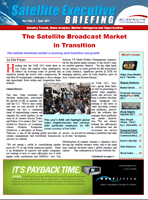Questions for Former SSPI Chairpersons
by Lou Zacharilla
The one flaw with Facebook and Linkedin is that neither has finger food or drinks. The satellite industry is fed and advanced through a group of trade associations and special interest groups which play an important role in keeping this small, but influential and globally dispersed group of professionals intact. As new customers embrace satellite, and potential markets begin to take interest, the need to use associations to advance the benefits of satellites grows. Satellite Nation also faces opportunities and threats for which it must advocate and defend against if it is to ensure its future.
Among the industry’s advocates and associations, the Society of Satellite Professionals International (SSPI) (http://www.sspi.org) is the “dean.” Its longevity and role as an advocate for every individual whose work or interests touch satellites, has made it the honest broker worldwide.
Throughout its long history, The SSPI has been led by the most respected leaders in the industry. Each has contributed to make SSPI the voice for the entire industry and for bringing it in line with the needs of future leaders. SSPI’s method is education but also the industry’s most attended event, the Gala.
As the industry heads into 2013, I asked three previous chairpersons, Ellen Hoff (President, W.L. Pritchard & Co.), Maury Mechanick (Counsel, White & Case LLP) and Clayton Mowry (President, Arianespace USA) to share their views on this most social of social networks.
Lou Zacharilla (LZ): Each of you has led the Society of Satellite Professionals International. You also serve other trade associations and groups. What is the importance of these groups today?
Maury Mechanick: Their role is very important. Despite social media, the interactions we enable through SSPI’s programs produce networking, knowledge transmission and collective action of great significance. The best example was the way SSPI supported the work (of GVF) and other groups as we came together to defeat the first attempted expropriation of C-band by telecommunications interests.
Ellen Hoff: Having many affiliation groups is important. SIA (Satellite Industry Association) is aimed at following legislation on Capitol Hill in the USA and focusing on regulatory issues. Others ensure that members adhere to industry standards. SSPI is unique and very different. We encourage anyoneinterested in our industry regardless of age, training or rank, to mix with others. This is the virtue of an organization with local chapters. SSPI reflects the democratization of the industry. Engineers, lawyers and CEOs, as well as investment bankers and marketing people gather face-to-face, with no pressure. There is no caste system. So the trust developed through this association, like others leads to good things. These are deals and advancements in engineering. This is why the SSPI Gala is a terrific new business investment.
LZ: And your companies could not afford it alone. Clayton, do you agree?
Clayton Mowry: I agree. Despite the fact that virtual networks allow us to “friend” scores of people remotely, there is no substitute for real human contact because without it there is no way to deepen relationships, share nuanced information and, frankly, help one another.
LZ: It’s interesting that you each emphasized the premium of the “physical” network over the electronic one. Maury acknowledged how associations can trigger collective action. Another important aspect of this, it seems to me, is mentorship. On November 13 another SSPI chairman (and current chairman of Radio Frequency Interference-End Users Initiative), Rich Wolf, of ABC Television in New York, will receive the industry’s Mentor of the Year award. How do you view mentorship and its role?
Hoff: It is critical. The old “employment for life” model is breaking down. Mentorship is a way to help one adjust to different work cultures. Believe me, a good mentor can save you from a bad boss. Even formal education cannot substitute for a mentor. A lifetime educator or “coach” helps you advance faster.
Mechanick: Ellen’s right. In our industry, mentoring is the foundation because of the nature of our work. Rich deserves this accolade because he articulates this in every way.
Mowry: I would not have come to where I am today with Arianespace without a mentor. A good mentor helps you keep pressing on. I can’t tell you how important that is in life, no matter what you do.
LZ: What I admire about Rich and Ellen as well is how they mentor the industry. Rich is a customer to a number of SSPI members. Yet he chose to lead the association - twice. He told me that he did it as a way to keep learning and to make people better vendors. I always found that amazing. That’s a rare insight from a very busy guy.
Mechanick: Another aspect of mentorship is one that does not get full recognition. It is the importance of establishing an “institutional memory” between generations of leaders. Passing along knowledge of how and why changes come about is quite critical. Many lessons that were learned the hard way can be shared and avoided. How much is that worth?
LZ: I remember being at the SSPI Gala (URL) a few years ago when a senior executive for Cisco, who was with their then-new (and now abandoned) Internet Router in the Sky initiative, came up to me. He was pretty new to our business. He looked around and concluded that the satellite business really was unique. “I realized something this year,” he said. “I realized that it is damned hard to put something into space and to keep it there!” He was serious.
That wasn’t exactly news to us, but you could sense his appreciation. I thought, “Here is a new tech guy showing his appreciation for what many consider ‘old tech.’”
A few of us discussed this afterward. What we concluded was that putting something in space is not easy, but it is not really the hard part. The hard part for the many engineering-type businesses in our industry seems to be trying to understand simple principles of marketing and then identifying a way to tap new markets for satellite services. Assuming this is true, how can our industry and its associations do a better job at that?
Hoff: I think the main challenge is to talk to customers and prospective new customers in new industries, more often. We really don’t do it enough as individual companies. It is tough to identify new markets for satellite services. Associations play a key role here. They, better than most, can bring people together on panels and other places, as SSPI does, to ask questions and to educate.
Mowry: Ellen’s right. Organizations like SSPI can best help us shape new markets by fostering cross-industry discussion and dialogue. It is amazing how these exchanges of ideas can help reveal unexplored possibilities for the satellite marketplace.
Hoff: We are not talking here about industry panels where we speak to each other. Many of the panels I see are among members of the industry talking to each other, not members of our industry listening to new prospective customers - or even EXISTING customers.
Mowry: I agree. There are many growth opportunities out there. There’s a strong case for expecting a great deal of growth to come from emerging economies, many of which are looking beyond fiber, cable, and copper to satellites for serving telecommunications needs, especially in Sub-Saharan Africa, South America, and other equatorial regions.
Mechanick: One of the principal determinants of demand for bandwidth today, which is what satellite services are all about, relates to the delivery of a continually broadening array of information content, particularly at the end-user level, whether in a business or consumer context.
LZ: But you cannot just put stuff in the sky and expect new customers to come to us?
Mechanick: Right. One of the keys to identifying new markets for satellite services is developing an ability to anticipate how changes in consumer consumption of information services and products will build or create future expectations and needs.
LZ: We’re back to Ellen’s “ first listen to them” theme. Once you’ve figured out how to listen more effectively, then what?
Mechanick: You then must be proactive and figure out a role for satellites to ensure that their expectations can be met. This applies to every market because it is fundamental marketing.
LZ: Sounds like good marketing principles at work here. Some things do not change. So, associations can break ground in new areas by patiently listening to the needs of potential new markets and bringing together buyers and sellers for a dialogue. This can occur online, at industry events, including panels and social activities and needs to occur consistently until we identify real needs. At that point we usher in our industry. That’s good advice for 2013.
------------------
 Lou Zacharilla is the Director of Development of the Society of Satellite Professionals International (SSPI). He can be reached at: LZacharilla@sspi.org
Lou Zacharilla is the Director of Development of the Society of Satellite Professionals International (SSPI). He can be reached at: LZacharilla@sspi.org





